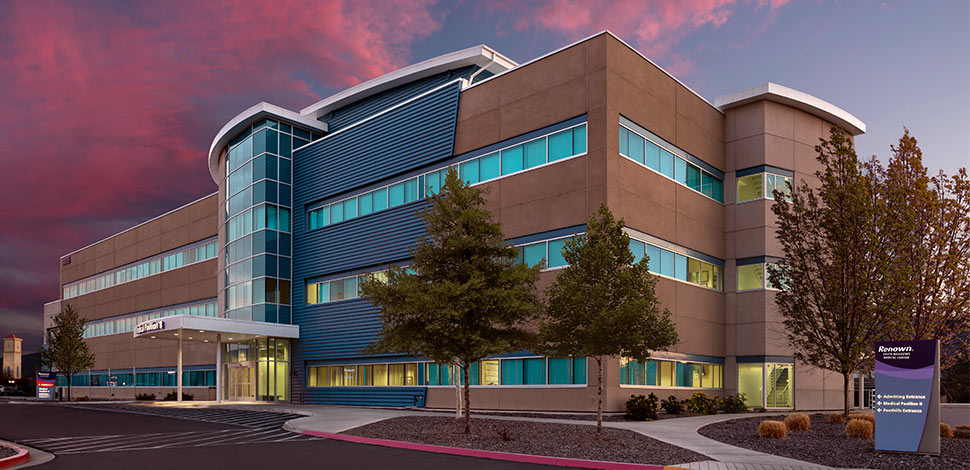Search
-
 Renown South Meadows Medical CenterRenown South Meadows Medical CenterHours
Renown South Meadows Medical CenterRenown South Meadows Medical CenterHours
Open 24 hours a day, 7 days a week, 365 days a year -
Palliative and Supportive Care
Compassionate Care Palliative and Supportive Care provides specialized medical care for serious illnesses and diseases, including advanced kidney failure or heart disease. Palliative Care helps to: Prevent and relieve suffering to help build the best possible quality of life. Add value to standard therapies by assisting with advanced illness planning and symptom management. Palliative & Supportive Care may be needed if: You've had multiple hospital admissions for severe illness. Severe pain, nausea, fatigue or other symptoms impacting quality of life and you are reconsidering treatment plans. Treatments are no longer working. You're feeling hapless or discouraged about the future due to your serious illness. Talk to your doctor to find out if palliative care is the right choice for you or your family member. Your Care Team Your palliative care support team comprises doctors, nurses, chaplains, social workers and other specialists who work together with you to provide extra support. Your care team can help: Facilitate close communication between you and your physician team, as well as nurses and specialists. Offer medical assessments and symptom management to help reduce pain, nausea, fatigue, shortness of breath and anxiety. Improve the ability to tolerate medical treatments and fain the strength to live a productive daily life. Explain treatment options and the decision making process regarding care. Navigate the healthcare process. Lend emotional and spiritual support.
-
Spiritual Care
Spiritual Care for You and Your Loved Ones Well-balanced healing involves caring for the whole person – body, mind, and spirit. Renown Health's Spiritual Care team provides compassionate care and support for you and your family, always respecting your spiritual preferences. How we support you: Religious or spiritual support End-of-life care Guided family conferences Support groups Chaplain visits A quiet space for prayer Multi-faith services Blessings, prayers or sacraments at the bedside
-
Hospice Care
When medical treatments no longer offer a cure, Hospice Care offers a special way to care for you and your family who are faced with a life-limiting illness. Serving Washoe, Lyon, Storey and Carson Counties, our team is available 24 hours a day, seven days a week. Hospice staff receive special training to care for all types of physical and emotional symptoms that cause pain, discomfort and distress. When considering your options for end-of-life transition, our team is available to answer questions and discuss if Renown Hospice Care will meet your needs. Your hospice care team includes Medical Director Registered Nurses Certified Nursing Aides Medical Social Workers Chaplains Registered Dietitians Trained Volunteers
-
Spine, Sports and Pain Management
How We Can Help You may benefit from treatment for neuromuscular (nerve, muscle and bone) disorders – that cause pain and impair normal functions. But, first, consult your primary care physician for a referral to Renown Health's Spine, Sport & Pain Management. Dr. Keating, Medical Director and his colleagues, Dr. Su and Dr. Storm, will customize a treatment plan that best suits your needs and lifestyle while providing the most effective care possible. For more information: Call 775-982-3608 | Fax 775-982-8001
-
Helpful Caregivers Make a Wedding Dream Come True
A wedding is a big day for the wedding couple, but it’s also special for loved ones. A patient at Renown, Ken, got to take part in his daughter’s special day as her wedding plans changed to accommodate his medical condition. Grab some tissues and read how Renown’s team of compassionate caregivers and chaplains planned a wedding in Fianna’s Healing Garden. Ken was hospitalized at Renown Regional Medical Center where he was battling a lung problem – which was unrelated to COVID-19 – and his condition worsened rapidly on Wednesday, Aug. 12. His family made the decision to transition him to palliative care, which helps patients near the end of their lives remain comfortable, while supporting their dignity and quality of life. Ken’s medical condition altered wedding plans for his daughter, Chandra, and her fiancé, Tyler, who were planning to tie the knot later in 2020. Chandra wanted her father there, but knew he could not leave the hospital. That’s why Chandra’s sister, Heather, approached Ken’s care team with a request to have a small wedding ceremony at the hospital. Planning the Wedding A member of Ken’s care team, Amy Heston, registered nurse (RN), began planning how the wedding could be held outdoors in Fianna's Healing Garden in the E. L. Wiegand Pavilion, which was donated by the E. L. Wiegand Foundation. In 24 hours, Amy planned a wedding ceremony with the help of her colleague, Breyanna Aufiero, RN; the Renown Spiritual Care team; and nursing leaders on the coronary intensive care unit (ICU). Together, they decorated the aisle in the garden with flowers and battery-operated candles. They also made a sign for Ken’s hospital bed, which read, “Father of the Bride,” and crafted a bow tie for him to wear for the special occasion. With visitor restrictions in place at the hospital due to coronavirus (COVID-19), having the wedding outside in the Healing Garden allowed for more members of Ken’s family to attend including his wife, Charlotte, and his dog, Bella. Every step in planning the wedding required thoughtful and thorough care coordination so Ken could participate. His breathing was supported by oxygen and special arrangements were made to transport the oxygen tanks he needed to take part in his daughter’s wedding. Amy worked with respiratory technician, Kasey Benfield, and critical care technician, Ruben Duckworth, to ensure Ken’s oxygen needs were met using portable machines. Celebrating Love and Life Together Ken’s team of caregivers bathed him and shaved his face so he could look and feel his best for the ceremony. They put on his bow tie, covered his bed in decorations and his favorite blue, flannel blanket, and wheeled his bed outside for the ceremony. Renown associate chaplains Terri Domitrovich and Susan Palwick coordinated music and performed the ceremony for Chandra and Tyler on Thursday, Aug. 13, 2020. The bride and groom shared their first dance in the garden and Ken’s care team provided water and treats to give the family a full wedding experience. Shortly after the ceremony, Ken passed away. This wedding provided Ken and his family meaningful memories for their big life-changing moments as they celebrated and said goodbye. “Seeing Ken surrounded by family he never would have gotten to see again while in the hospital, watching him get to share a father-daughter dance with Chandra on her wedding day, and having him tell me that this day meant more to them than we would ever know were some of the most moving moments I’ve witnessed as a nurse,” Amy said. “I am so thankful for the team we have here. I know that this beautiful day wouldn’t have happened without the help of every single person who gave their time, money, creativity and passion to make it a day to remember.”
Read More About Helpful Caregivers Make a Wedding Dream Come True
-
Here's How to Commemorate National Healthcare Decision Day
National Healthcare Decision Day is forthcoming. Here’s an easy and free way to commemorate the occasion: openly discussing how we want to be cared for at the end of our lives. Join Renown Health’s experts at a workshop about making decisions about an advance directive. Among the random national holidays, this one has significance: April 16 is National Healthcare Decision Day. And experts agree that the best time to discuss your views about end-of-life care and to learn what choices are available is before a life-limiting illness or crisis occurs. By preparing in advance, you can help reduce the doubt and anxiety related to decision making for your family if you cannot speak for yourself. “Completing your advance directive is a gift you give your family,” says Mary-Ann Brown, RN, MSN, director of Palliative Care. “The stress associated with these difficult decisions is decreased if everyone knows what is important to you and what you want the end of life.” What Are Advance Directives? An advance directive is a document that states your choices about medical treatment and names another person to make medical decisions on your behalf if you are unable to. This document allows you to make legally valid decisions about future medical care. Find more information about advance directives and the form online. The Conversation The first step in completing an Advance Directive is to think about what’s important to you and talk to your loved ones. The Conversation Project provides helpful tools to guide you and your family through this challenging topic. Getting this information together will help you fill out and complete your advance directives. Some things to consider and discuss with your family include: When you think about the last phase of your life, what’s most important to you? Who do you want involved in your care? Who should make decisions on your behalf if you’re not able to? Where do you want or not want to receive care? Are there specific treatments you would or would not want? Complete Your Advance Directive Planning In order to complete an advance directive, you will need either two witnesses or a notary to sign the form. Be sure to note restrictions on the witness process. When an advance directive is complete, you should keep the original. Copies should be given to your agent named in the form, your family, your doctor(s) and the location that you receive care. Renown Health offers four advance directive workshops every month to cover the details of filling out this document. A healthcare team is available to answer questions and work through the process with you. A notary is also present to finalize the process, which means you can complete your advanced directives during this workshop. Find the workshop by calling 775-982-RSVP for more information. Advance Care Planning Workshop April 17, 1-2:30 p.m. | Free Join Renown Health’s experts for a workshop about making decisions regarding end-of-life care. You will learn how to fill out an advance directive, receive one-on-one assistance and have your documents signed by a notary. Workshops are typically held several times each month. To RSVP, call 775-982-7787
Read More About Here's How to Commemorate National Healthcare Decision Day
-
Grief and Bereavement Resources
Feelings of grief can take on many forms and can occur in reaction to many situations, including the death of a loved one or a medical diagnosis for yourself or someone close to you. It is important to remember that this reaction is entirely natural, and many people who experience grief find outside help to be a valuable part of the healing process. Below is a list of both local and national grief and bereavement resources for all ages and specificities. If you or someone you know is experiencing grief, the trained professionals below are here to help. Solace Tree Support groups for children and teens (ages 3 to 18), young adults and their family members. For more information visits solacetree.org/grief-programs or call 775-324-7723. Healing Minds Counseling services for those coping with the loss of a loved one or major life change. For more information visit healingminds.com/grief-counseling-reno-nv or call 775-448-9760. Circle of Life Hospice Support groups open to the community held the first and third Tuesday of every month. Fore more information visits colhospice.com/bereavement-and-spiritual-care or call 775-827-2298. Summit View Hospice Grief and bereavement support open to the community-groups, memorials and by mail. For more information visit summitviewhospice.com or call 775-636-9598. The Compassionate Friends Monthly support group on the second Monday of each month for families after a child dies. Fore more information visit facebook.com/TheCompassionateFriendsofReno, compassionatefriends.org or call 775-750-7005. Healing for Survivors of Suicide Links and resources for those who have lost a loved one to suicide. For more information visit survivingsuicide.com GriefShare Grief recovery support groups meeting weekly both in-person and online with options in Reno/Sparks, Carson City and rural cities. For more information www.griefshare.org National Alliance for Grieving Children Resources for parents and caregivers to help children navigate the challenges of bereavement and grow into healthy adults. For more information visit nacg.org/resources-and-support/ Mourning Hope Grief Center Grief support groups, counseling, resources and COVID-19 support for children, adults and families before and after a death loss. For more information visit mourninghope.org Crisis Support Services of Nevada 24/7, free, confidential and caring support to people in crisis across Nevada and the U.S. For more information visit cssnv.org, call 775-784-8090 or text CARE to 839863 National Alliance on Mental Illness-Warmline A stigma-free, non-crisis phone service you can call or text that is staffed by trained peers in recovery. For more information visit namiwesternnevada.org/resources/ or call 775-241-4212. Vitas Healthcare Grief and bereavement resources and support groups both virtual and phone-in. For more information visit vitas.com/family-and-caregiver-support or call 866-489-0583. St. Mary’s - Hospice We Promise Resources on grief for all groups including children to adults, trauma, caregivers and more. For more information visit hospicewepromise.com/topics/grief or call 775-525-6700. Mountain View Mortuary Grief support and tools available to assist you in your healing journey including “365 Days of Healing” email list for daily support and comfort. For more information visit mountainviewmortuary.net/resources/grief-support or call 775-788-2199 Sesame Street – Helping Kids Grieve Discover games, videos and more on topics important to you and your child. For more information visit sesamestreetincommunities.org/topics/grie Trauma Intervention Program-Northern NV A national non-profit organization of volunteers dedicated to ensuring those emotionally traumatized receive assistance. For more information visit tipnnv.org/about-tip/resources Pregnancy & Infant Loss Support Organization A non-profit organization dedicated to the support of families who have lost a baby through miscarriage, stillbirth or neonatal death. For more information visit pilsos.org Caring Info A program of the National Hospice & Palliative Care Organization providing free resources to help people make decisions about end-of-life. For more information visit nhpco.org/patients-and-caregivers/
-
Concussion Risks and Prevention
It’s important to be aware of the risk of a concussion, which can have serious health implications. Susan Park, MD, discusses the effects of concussions and how they can be prevented. According to Susan Park, MD, a Renown Medical Group doctor who specializes in sports and family medicine, concussions are a serious issue — especially among children whose developing brains “are more susceptible to brain injury and long-term effects from concussions.” All parents, coaches and athletes, she points out, should be aware of the risks of concussions and take precautions to avoid them. What is a concussion and how does it occur? Dr. Park describes a concussion as a traumatic brain injury resulting from direct or indirect impact to the head or body, during which the brain shakes back and forth in the skull. This may cause some bruising of the brain. In severe cases, traumatic head injuries can cause bleeding, which if not treated quickly, can be fatal. What are the health implications of a concussion? Symptoms of drowsiness and confusion can be a sign of a concussion after a head injury. Some short-term effects may include headaches, dizziness and difficulty concentrating. Long-term concerns can further include mood disorders, sleep disturbance and problems with cognitive function-concentration, which may affect school performance. What sports carry the highest risk of suffering a concussion? Dr. Park notes participation in any impact sport can result in a head injury. But among school-age kids, she treats more concussions from football and soccer than any other sport. However, during the winter months, skiing and snowboarding injuries can be a common cause of concussions Any blow to your head, neck or upper body can result in a concussion with symptoms including, but not limited to, feeling dazed or confused, dizziness, nausea/vomiting or a headache. Initial treatment of concussions varies depending on severity. Rest, avoiding vigorous activity and a reduced school workload help young athletes recover after a concussion. Dr. Park notes that sometimes further imaging and an ER visit will be required. Otherwise, rest from activities is the main treatment, along with not returning to sports activities until further clearance from a healthcare provider.
-
Plan Early: Completing Your Advance Directive
We plan for the birth of a child, weddings and retirement, but rarely do we discuss how we want to be cared for at the end of our lives. Getting through this challenging conversation and completing an Advance Directive can give you peace of mind that your loved ones will not have to make difficult choices on your behalf. The best time to complete an Advance Directive is now – don’t wait until a life-limiting illness or crisis occurs to discuss your views about end-of-life care and to learn what choices are available. By preparing in advance, you can help reduce the doubt and anxiety related to decision-making for your family if you cannot speak for yourself. What are Advance Directives? An Advance Directive is a document that states your choices about medical treatment and names another person to make medical decisions on your behalf if you are unable to. This document allows you to make legally valid decisions about future medical care. “Completing your Advance Directive is a gift you give your family,” says Director of Palliative Care, Mary-Ann Brown RN, MSN. “The stress associated with these difficult decisions is decreased if everyone knows what is important to you and what you want at the end of life.”
Read More About Plan Early: Completing Your Advance Directive
-
When Is It Time to See a Physiatrist
Physiatry (fi-zahy-uh-tree), also referred to as physical medicine and rehabilitation, encompasses the diagnosis, prevention and treatment of disabilities or injuries related to the brain, nerves, bones and muscles. The goal of this specialty is to maximize physical functioning, greatly decrease or eliminate pain, foster independence and improve quality of life for those suffering with a disability, chronic pain and physical impairments. Who Is It for? Physiatry can help patients with functional deficits and secondary medical conditions as a result of the following: Amputation Brain Injury Osteoarthritis Spasticity and Movement Disorders Spinal Cord Injury Spine Pain Sports-Related Injuries Stroke Some of these medical conditions can often cause chronic pain or impede physical functioning, ultimately affecting a person’s overall well-being and making it difficult for them to sustain a desired quality of life.










